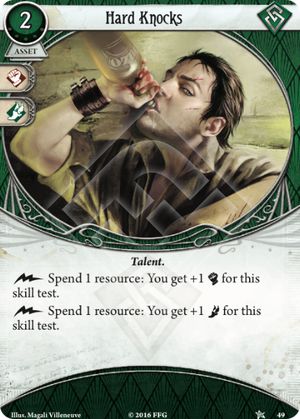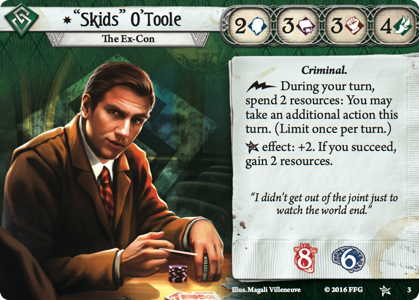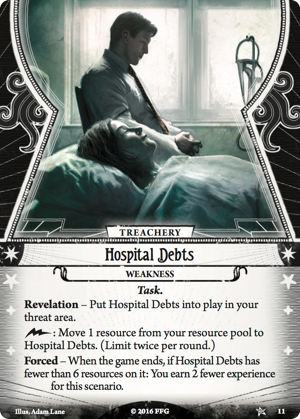Some of the Arkham Files investigators are
heroes by default. Two of them have been covered in my previous entries. A
Librarian easily fits the archetype of an investigator. So does a FBI agent,
strong and bold. Some of the characters are just more or less regular people
(see: Wendy, Jenny) suddenly confronted with the unnatural threats. Some,
however, have an antiheroic feel to them. Skids, the ex-con is clearly one of
them. World of Arkham Files is not discriminating, though. If you only have the
will and the stomach to face the horrors of the mythos world, you are more than
welcome to do so.
Legacy: Skids consistently appears throughout the
Arkham Files series, albeit it’s the first time he made his appearance so
quickly – in the base set already. It was bit of a disappointment to see his
very original ability (basically his signature ability) replaced. In every
Arkham Files game so far he was able to re-roll unfavorable results – ‘1’s in
Arkham Horror and Eldritch Horror and all dice with a chosen result in Elder
Sign. I guess it wasn’t too easy to come up with a similar idea for AH:TCG, yet
it still feels bad. To add an insult the injury, Arkham designers come up with
a card “Hard Knocks”, a name that was reserved for Skids’ ability. I have to admit,
I was a big fan of his ability and enjoyed playing him, particularly in
Eldritch Horror (higher sanity made him very reliable at monster-killing and
less fragile to random negative effects).
Except for
a high strength value (and THE ability), there wasn’t much of a unified idea of
Skids. His mental skills and Stamina/Sanity vary a bit between each of the
Mythos-themed game. In Arkham he is a Rogue, which seems to make sense, given
his… hmm... profession.
 |
| You are not the true Hard Knocks! |
Skill Values:
Let’s start with the positives. A decent Combat of 3 sets him up quite well for
fighting the enemies. With a whooping Agility of 4 he can also attempt to run
away from them (and avoid some Encounter Deck cards1). Intellect of
3 does not cause any troubles, neither, allowing for quite a reasonable investigating
– just in case he gets stuck with high shroud locations, I’d still pick 2
copies of “Evidence”, though.
His low Will is a substantial issue, though.
There are many Encounter Cards just waiting in the deck to hit him straight
into his face. Once he’s frozen by fear, he can spend turn after turn
terrified, constantly losing actions and failing the test to recover. Cryptic
Chill strips him out of his assets… the list goes on and on.
On top of that, his Combat is lacking a bit.
Unlike Roland, he needs to keep committing icons/resources (through Hard Knocks
or Physical Training) for Fight tests to have a decent shot against medium-strength
opponents, even if wielding a weapon. It makes him not very consistent as the
party main fighter. Having high Agility puts another question mark next to his
role as a killer. He would be much easier to picture and assign a role, if he
had more of a clear profile of either a warrior or an elusive guy. It does not
make creating an effective deck easy, neither.
 |
| Skids can easily succumb to madness, when faced with unnameable horrors |
What Will exactly represents might be a
matter of a debate. Still for an ex-con, after few years of jail time to have
Will lower than his Intellect is sort of strange. Otherwise his stats fit the
picture of a witty, stealthy and yet sturdy ex-criminal.
Strength
Theme
Special abilities: Upon analyzing both Skids and
Jenny I have an impression, that Rogue characters are designed with certain
versatility in mind. While the cards themselves seem to slightly favor evading
the enemies and attacking them from the shadow (which fits an idea of a Rogue
character), the investigators are equipped with abilities, which can be used to
fuel different playing styles.2
An extra action
at cost of 2 resources allows Skids to do exactly what is needed in a given
moment. And a Rogue character has the most chances at having spare resources –
Burglary and Hot Streak give him good means to gather resources.
On the
other hand, it is an ability, which directly requires paying, and quite a step
price. An additional action does not guarantee a result, neither – unlike Roland’s
ability, generating free clue without a test. Therefore I consider it slightly
subpar.
I also
really dislike it from the thematic point of view – I am missing the good old
Skids so much. On top of it, ability seems to suit Wilson, the Handyman, much
better.
I only have some vague ideas, how to reflect
his good old ability. I have an even better idea how to make “School of Hard
Knocks” a cool signature card (please see below).
Skids’ Elder sign effect, on the other hand,
is very strong, allowing to both pass the test and gain 2 resources! It brings
even more flavor if you draw it when using Burglary (“Five resources at once!
Score!”) or when dealing with encounter deck (“Ha-ha, I turned Cryptic Chill
into a profit!”).
Strength
Theme
Signature cards: At this point you probably are quite convinced I am not a big fan
of Skids. Moreover, you’re wondering if it’s only due to his character not
fitting my playing style or is it more related to him losing his signature
ability along with general design I consider not thematic enough. To be honest
with you, I am not sure myself.
His signature card doesn’t help to improve
my sentiment, neither. On paper it seems to have some real potential. You can
play it and go do things requiring Skids’ attention, despite being engaged with
enemies, or even engaging them on the way. You can meanwhile also equip
yourself with weapons/resources to fight them next turn.
In practice, however, you rarely benefit
from it much more than from Dodge. And it seems to me, even the designers have
noticed it’s not strong enough, as the card has 4 skill icons, including two
Wild ones. I guess they had seen it committed to a skill test a lot during
play-testing. And this is how I usually spend this card – sometimes as an extra
Unexpected Courage, sometimes for a whopping 3 skill icons.
I have come with an alternative of my own to On the Lam. Yeah, you guessed it – “School of Hard Knocks”.
Event,
cost 0. Play when you’re about to lose a skill check by 2 or more. Pass that
skill check, instead. Shuffle “School of Hard Knocks” back to your deck.
Isn’t it nice? Heroic feel of succeeding
against all odds, Rogue-ish versatility, appropriate strength… Please let me
know your thoughts about it, I am very eager to read your comments!
 |
| Skids' story is sad and still his mother's sickness is haunting him even after she died. |
I’ve been bashing Skids’ design for quite a
while, so it’s time for a break. I very much like his weakness. The story
behind Skids’ life of crime is with us since Arkham Horror. Hence the card
directly translating it into game totally makes me feel like I’m playing Skids.
Moreover, the card represents the idea of debt perfectly3. Since
many of his traits relate to resources (Special ability, and Elder Sign effect),
it also adds up to an uniform vision of the character (Just like Roland’s clues
and Daisy’s Tomes).
From the game play perspective it is fairly average.
Not too crippling, yet definitely not something one can ignore or deal with too
easily.
Strength
Theme
Class/Deckbuilding
options: When it comes to the deckbuilding, I have the same reservations as with
Skids’ stats. There seems to be slight disconnection between Rogue options
(evading, attacking exhausted – hence evaded – enemies) and Guardian brute
force approach. However it’s definitely not as prominent as with the skill
values, since you can simply make him a very efficient killing machine (using
weapons from both classes, Vicious Blows etc.), while also pulling some neat
tricks, available for Rogues. You can use Burglary (or, later on Hot Streak) to
pay for your weapons, deal huge damage with Backstab (without even needing a
weapon!) or use services of Leo to gain great action advantage4. His
fellow fighters from the Guardian team do not have this option available for
them. He can use most of the Guardian upgraded cards (with an exception for of
Shotgun), as well.
The choice of class for Skids is very logical and consistent. There is no
question, he fits the Rogue profile. And as he’s been a fighting character in each
of the Arkham Files games, a Guardian sub-class was a natural choice.
Strength
Theme
I have to make a confession. I went through a lot of effort to try to
like Skids. I played the base game campaign multiple times last week to find
some bright sides of him. I managed to slightly improve my opinion of him, I
still, see him as a subpar character, and possibly a wasted design opportunity.
With his sub-par investigating abilities, Skids is not suited too well
for a solo play. In a team it’s good to pair him with someone, who handles most
of the investigation. Therefore his natural partners are Seekers.
 |
| Skids I miss the most. |
Strength
Theme
All images are courtesy of cardgamedb.com and fantasyflightgames.com
1 Will seems to be the most tested skill by
the encounter deck, with the second being Agility. It makes sense – one can
easily go through the game without casting any spells and evading enemies, so game
mechanism should force testing these skills to keep them relevant. Great design
choice!
2 Further to this – it seems that each of
the four classes has “their” skills, with Rogue being more of a
jack-of-all-trades class. Even their special skill card has a Wild symbol
(Opportunist; other classes have Vicious Blow, Deduction, Fearless and Survival
Instinct).
3 Per official ruling, if an investigator
resigns without completing their task weakness, they do not suffer its
consequences. At first I wasn’t satisfied with this idea. It not only gives an
easy way out, but also gives additional benefit to multiplayer games. Player
haunted with their weakness can resign shortly before the other one successfully finishes
the scenario. However, there is a very good thematic explanation for this
design choice (regardless if it was the reason for this decision or not). Resigning
simply provides the investigator with time and opportunity to deal with their obligations. They can take care of the debt, or search for the missing sister.
16.02 Addendum
As per official FAQ released yesterday, this is not true anymore. Resigning causes you to trigger the "end of the game" (hence: fail) effect of the missions. Now, this is going to hurt and sort of renders my above explanation obsolete and/or inaccurate.
4 It seems, Skids is waiting for Charisma to
be an officially released card almost as hard as no one else – this way he can
use both Leo and Beat Cop.




















